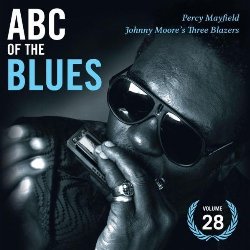ABC Of The Blues CD28 (2010)
ABC Of The Blues CD28 (2010)

CD 28 – Percy Mayfield & Johnny Moore’s Three Blazers 28-01 Percy Mayfield – Please Send Me Someone to Love 28-02 Percy Mayfield – Strange Things Happening 28-03 Percy Mayfield – What a Fool I Was 28-04 Percy Mayfield – Lost Love (Baby, Please) 28-05 Percy Mayfield – Advice 28-06 Percy Mayfield – Nightmare play 28-07 Percy Mayfield – You Don’t Exist No More 28-08 Percy Mayfield – Get Way Back 28-09 Percy Mayfield – The River’s Invitation 28-10 Percy Mayfield – Life Is Suicide 28-11 Johnny Moore’s Three Blazers – Dragnet Blues 28-12 Johnny Moore’s Three Blazers – Saturday Night (Four Nights Drunk) 28-13 Johnny Moore’s Three Blazers – Johnny, Johnny 28-14 Johnny Moore’s Three Blazers – Down in Texas 28-15 Johnny Moore’s Three Blazers – Be Cool 28-16 Johnny Moore’s Three Blazers – Playing Numbers play 28-17 Johnny Moore’s Three Blazers – Crazy with the Blues 28-18 Johnny Moore’s Three Blazers – Nightmare Blues 28-19 Johnny Moore’s Three Blazers – Gee, It’s Rough 28-20 Johnny Moore’s Three Blazers – I Don’t Know, Yes I Know
Percy Mayfield (12 August 1920 - 11 August 1984) was an American singer & songwriter famous for the songs “Hit the Road, Jack” and “Please Send Me Someone to Love”.He was known as “Poet Laureate of the Blues”.
Mayfield was born in Minden, Louisiana. As a youth, he showed a talent for poetry, so he thought he would try songwriting and singing. He began his performing career in Texas and had moved to Los Angeles by 1942.
He auditioned his song “Two Years of Torture” to Supreme Records (a Los Angeles-area record label) because he thought it would be a good song for Jimmy Witherspoon. The label liked his performance and asked him to record it in 1947. Although his vocal style was influenced by such stylists as Charles Brown, Mayfield did not focus on the white market as did many West Coast bluesmen. Rather, he sang blues ballads, mostly his own songs, in a gentle vocal style.
In 1950, he signed with Specialty Records and released several well-received R&B records. His most famous performance: “Please Send Me Someone to Love” was a number one R&B hit in 1950. His career continued to blossom with songs like “Strange Things Happening”, “Lost Love,” “What a Fool I Was,” “Prayin’ for Your Return,” “Cry Baby,” and “Big Question.” A 1953 auto accident left him seriously injured, including a facial disfigurement that limited his performing.
Mayfield’s songs tend to be downbeat and his lyrics tend to be heartbreaking, but his vulnerability and emotional sensitivity prevent songs like “Life Is Suicide” and “The River’s Invitation” from being maudlin.
Johnny Moore’s Three Blazers were a successful and influential African-American vocal and instrumental group in the 1940s and 1950s.
Johnny Moore (who was not related to the singer with The Drifters) and his younger brother Oscar grew up in Texas and then Phoenix, Arizona, where they both started playing guitar and formed their own string band. In the mid 1930s they relocated to Los Angeles, where Oscar Moore, who had become influenced by Charlie Christian and turned to jazz, joined the King Cole Trio.
Johnny Moore remained devoted to rhythm and blues, his guitar style being considered to be an influence on Chuck Berry. He joined and formed several groups, before forming The Three Blazers with two fellow Texans, bassist Eddie Williams and pianist and singer Charles Brown, who was newly arrived in the city. After the Cole Trio moved from Atlas Records to Capitol in 1943, Oscar Moore suggested to Atlas boss Robert Scherman that he replace them with his brother's group. Scherman agreed to record the Blazers if Oscar Moore would play with them, and the recordings were released as by 'Oscar Moore with The Three Blazers'. Although this upset Johnny Moore, it brought the group some exposure, and in 1945 they had their first hit, backing Ivory Joe Hunter on "Blues At Sunrise".
In 1946, they had greater success with "Driftin' Blues", sung by Charles Brown. Although Brown was the group's star attraction, Johnny Moore refused to allow him his own credit on the records. He also refused to sign an exclusive contract with any label, so that the group’s early records appeared on various labels, particularly Philo, Exclusive and Modern. The group followed up the success of “Driftin' Blues” with a number of other big R&B hits, including “Sunny Road” (1946), “New Orleans Blues” (1947) and “Merry Christmas Baby” (1947, but also a hit in 1948 and 1949).
In 1948, frustrated by his lack of recognition and financial reward, Brown left the group for a successful solo career. The remaining two Blazers continued with a succession of vocalists, notably Billy Valentine, Mari Jones, Floyd Dixon, and, in the mid-1950s, Frankie Ervin. After the Cole Trio broke up, Oscar Moore also played occasionally as a guest musician with the group. Johnny Moore and his group continued to record occasionally for small labels until the early 1960s.
download (mp3 @320 kbs):
yandex 4shared mediafire ulozto gett bayfiles
Zmieniony (Wtorek, 20 Sierpień 2019 19:52)








